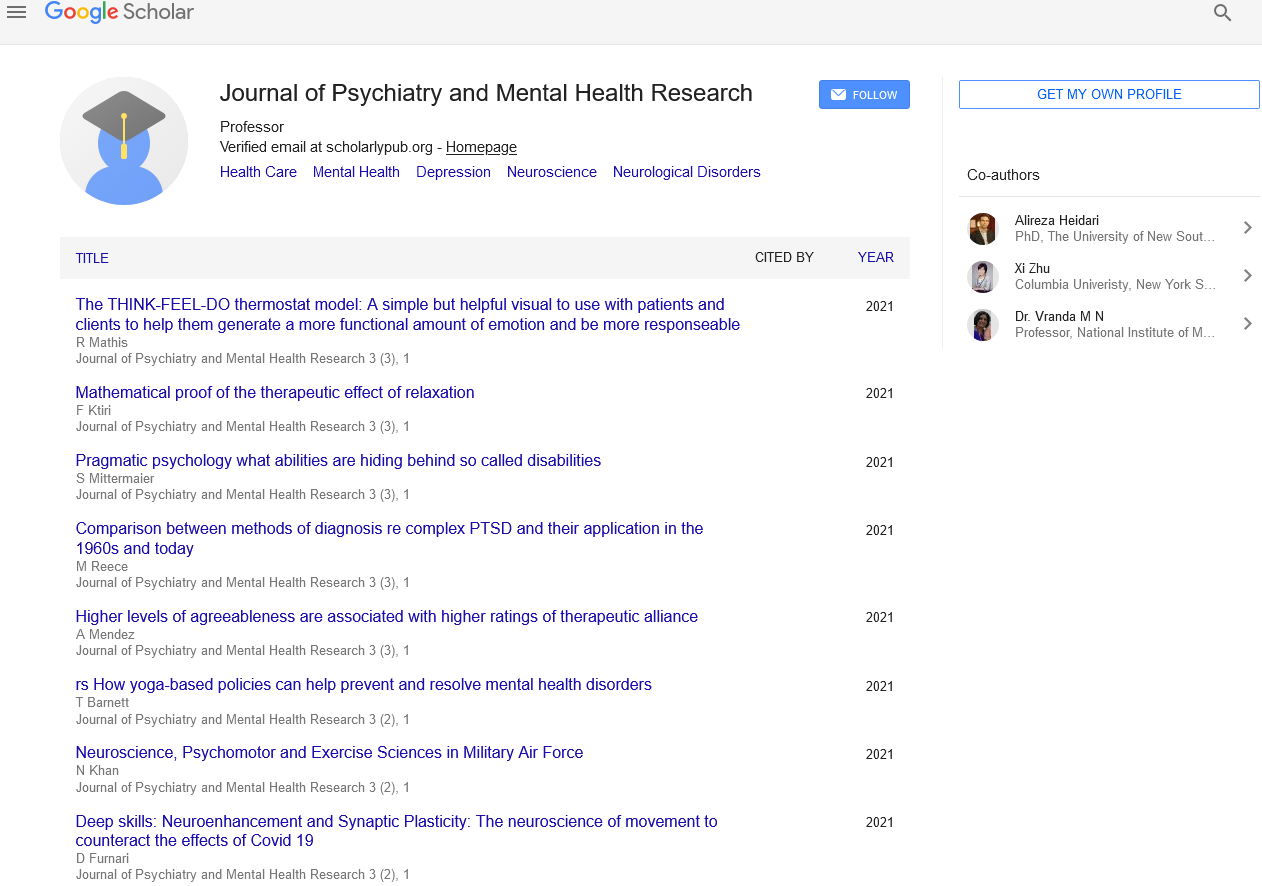the core symptom of depression is said to be anhedonia which refers to loss of interest or a loss of feeling of pleasure
Received: 03-Jan-2024 Editor assigned: 05-Jan-2024 Accepted Date: Jan 14, 2024; Reviewed: 08-Jan-2024 Revised: 12-Jan-2024 Published: 23-Jan-2024
This open-access article is distributed under the terms of the Creative Commons Attribution Non-Commercial License (CC BY-NC) (http://creativecommons.org/licenses/by-nc/4.0/), which permits reuse, distribution and reproduction of the article, provided that the original work is properly cited and the reuse is restricted to noncommercial purposes. For commercial reuse, contact reprints@pulsus.com
Editorial Note
Depression is a mental state of low mood and aversion to activity. Classified medically as a mental and behavioral disorder, the experience of depression affects a person's thoughts, behavior, motivation, feelings, and sense of well-being. Depressed mood is a symptom of some mood disorders such as major depressive disorder or dysthymia; it is a normal temporary reaction to life events, such as the loss of a loved one; and it is also a symptom of some physical diseases and a side effect of some drugs and medical treatments. It may feature sadness, difficulty in thinking and concentration and a significant increase or decrease in appetite and time spent sleeping. People experiencing depression may have feelings of dejection, hopelessness and suicidal thoughts. It can either be short term or long term. Adversity in childhood, such as bereavement, neglect, mental abuse, physical abuse, sexual abuse, or unequal parental treatment of siblings can contribute to depression in adulthood. Childhood physical or sexual abuse in particular significantly correlates with the likelihood of experiencing depression over the victim's lifetime. Life events and changes that may influence depressed moods include (but are not limited to): childbirth, menopause, financial difficulties, unemployment, stress (such as from work, education, family, living conditions etc.), a medical diagnosis (cancer, HIV, etc.), bullying, loss of a loved one, natural disasters, social isolation, rape, relationship troubles, jealousy, separation, or catastrophic injury Adolescents may be especially prone to experiencing a depressed mood following social rejection, peer pressure, or bullying.
Globally, more than 264 million people of all ages suffer from depression. The global pandemic of COVID-19 has negatively impacted upon many individuals’ mental health, causing levels of depression to surge, reaching devastating heights. A study conducted by the University of Surrey in Autumn 2019 and May/June 2020 looked into the impact of COVID-19 upon young peoples mental health. This study is published in the Journal of Psychiatry Research Report. The study showed a significant rise in depression symptoms and a reduction in overall wellbeing during lockdown (May/June 2020) compared to the previous Autumn (2019). Levels of clinical depression in those surveyed in the study were found to have more than doubled, rising from 14.9 per cent in autumn 2019 to 34.7 per cent in May/June 2020. This study further emphasises the correlation that certain life events have with developing depression.
Alcoholism
Alcohol can be a depressant which slows down some regions of the brain, like the prefrontal and temporal cortex, negatively affecting rationality and memory. It also lowers the level of serotonin in the brain, which could potentially lead to higher chances of depressive mood. The connection between the amount of alcohol intake, level of depressed mood, and how it affects the risks of experiencing consequences from alcoholism, were studied in a research done on college students. The study used 4 latent, distinct profiles of different alcohol intake and level of depression; Mild or Moderate Depression, and Heavy or Severe Drinkers. Other indicators consisting of social factors and individual behaviors were also taken into consideration in the research. Results showed that the level of depression as an emotion negatively affected the amount of risky behavior and consequence from drinking, while having an inverse relationship with protective behavioral strategies, which are behavioral actions taken by oneself for protection from the relative harm of alcohol intake. Having an elevated level of depressed mood does therefore lead to greater consequences from drinking.





